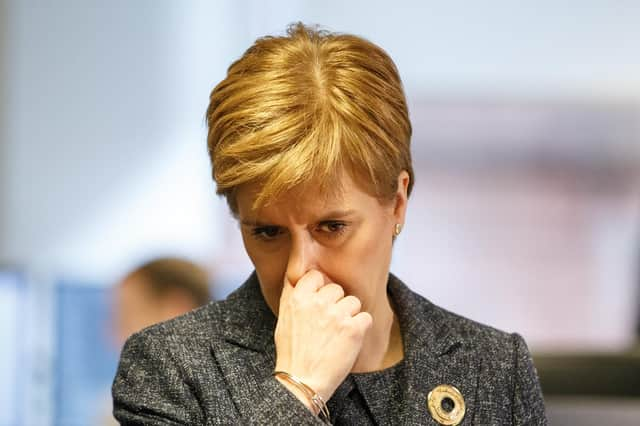One hundred days is not enough to save Nicola Sturgeon from failure - Brian Monteith


It will then have been 100 days that First Minister Nicola Sturgeon and her minority Government has had since being re-elected and given her many promises we shall be entitled to ask what’s changed for the better.
The First Minister promised us in advance of the election her administration’s first 100 days would be focussed on delivering Scotland’s Covid recovery, then reiterated her intentions in Parliament after being re-elected in May. How’s it going?
Advertisement
Hide AdAdvertisement
Hide AdTo say her Scottish ship of state is becalmed would be putting it kindly.
Let us recall what needs attended to. The NHS in Scotland is in ruins; thanks to huge shortages of consultants, doctors and nurses – following poor SNP decisions – Scotland’s NHS was already struggling to cope with demand. After Covid it has been moved from A&E on to a ventilator in ICU. Its prospects are not good. Just when Sturgeon had to get really serious about healthcare she appointed Humza Yousaf as health secretary. His priority is to create a new regulatory structure for social care, requiring more bureaucrats, inspectors and pen-pushers applying red tape when the massive growth in waiting lists – created by SNP decisions to restrict services – requires specialist staff, flexibility, and resources reaching the front line, not the back office. After becoming recently the Covid capital of Europe any chance of an independent inquiry into Scotland’s pandemic response – or a check-up on that cancer scare or chronic pain? 100 days won’t even begin to sort it.
Likewise, all levels of Scottish education continue to fail our children – anyone beginning school, age-five in 2007, and leaving, aged-18 this year, has only ever known an SNP education minister. Appalling falls in numeracy, literacy and comparative standards in science and maths, to the point that measuring them is prevented or discouraged, are ruining the life chances of a whole generation and hobbling our economy in the future. For me the realm of education has been Nicola Sturgeon’s greatest catastrophe that we shall still be putting right in ten years’ time, never mind one hundred days.
The same stands for so many responsibilities of the Scottish Government. The worst drug deaths in Europe – are they falling yet? Pot holes? Five times worse. Ferries to dependent fragile communities? Don’t get me started. The Justice service, chaotic and compromised.
What is the SNP Government good at?
Two things. Fanfares for the common man and winning elections.
The grand announcement is Nicola Sturgeon’s specialist subject, her top priority; aided by a phalanx of some fifty-plus media staff, the SNP Government is a world-beater at big ideas such as creating a Scottish Investment Bank, launching a Scottish energy company, saving Bi-Fab (not), nationalising Prestwick Airport, Ferguson Marine, ScotRail and underwriting aluminium smelting. It is all smoke and mirrors; hundreds of millions of pounds are moved around in budgets, tens of millions are regularly written-off and what have we got to show for it? Where’s the investment, where’s the cheap energy, where are the international flights, the ferries, the new rolling stock and the wheel hubs? Don’t expect the same people running the country into the ground to cure waiting lists, deliver postponed operations or resume school examinations in the first one hundred says.
It’s not just the orchestrated announcements that need so many salaried and pensioned cheerleaders funded on the Scottish taxpayers’ pound – having to defend or explain away all the mounting failures means there are never enough journalists and social media trolls when you need them. Expect their number to increase in the first one hundred days.
How does the SNP keep bouncing back no matter how bad its record? It says “look, there’s a squirrel” And we all look. We ignore the shambles of Scottish public services and scandals of SNP politicians in high office. The opposition parties see the squirrel and think how can we catch it, how can we tame it and keep it caged? They remain divided on how to do this so they remain opposition parties, with never one of them becoming big enough to form a new government that might stop looking at squirrels and actually start doing the job of governing for the people.
Advertisement
Hide AdAdvertisement
Hide AdThe dominant squirrel used to be Red, it was called “devolution” – but it has been replaced by the more divisive and aggressive Grey squirrel, called “independence”. Every time there’s a SNP government failure the media platoons make their fanfares and SNP ministers shout “squirrel” and the opposition are distracted and divided again.
Back in 2014 Scotland said it did not want the Grey Squirrel, it was happy enough with the Red Squirrel, thank you. So much damage has been done to public services since then that even the red squirrel is now being considered a pest. Not quite the vermin found in abundance amongst the unemptied bins of our SNP-controlled cities, but becoming progressively less popular.
The SNP leadership has known for seven years independence could not be delivered. They hoped that a Tory government elected in 2015 would favour them; then the Brexit vote in 2016, then Boris in 2019. None have made the difference. Even some of their former members and politicians now see through them. Hanging on to power by her fingernails and digging in is the real priority for the first Minister’s first one hundred days. But whatever she does I promise you this, the vultures are now circling, so she won’t reside in Bute House at the end of this Parliamentary term
Brian Monteith is editor of ThinkScotland.org and served in the Scottish and European Parliaments for the Conservative and Brexit Parties respectively